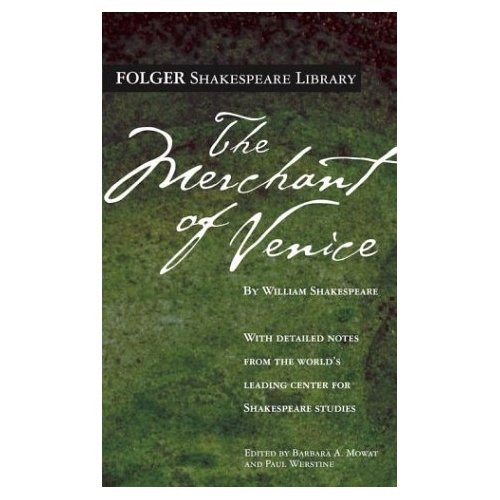 In my British Literature class, we are currently reading one of Shakespeare’s most controversial plays, The Merchant of Venice. Our professor prefaced the play with the fact that there was prejudice against Jews during Shakespeare’s time period and that we must just accept this as a historical fact and incorporate it as well as we can into our reading. While it is true, antisemitism was a common thing for Shakespeare’s day (Jews were in fact banned from England at this time), the play incorporates this prejudice in a strange way; Shakespeare presents it not merely as a historical characteristic, but as a question of an entire social construct. The play points out the Christian dependence on this prejudice to maintain their way of life. Jews during this time were forbidden to hold certain jobs and therefore, took on the roles that Christians morally could not: Money lenders. Therefore, the hateful words exchanged between the Christian’s and the “victim” Jew, Shylock, maintain a higher, more disturbing meaning than anticipated; the characters are actually biting the hand that feeds them.
In my British Literature class, we are currently reading one of Shakespeare’s most controversial plays, The Merchant of Venice. Our professor prefaced the play with the fact that there was prejudice against Jews during Shakespeare’s time period and that we must just accept this as a historical fact and incorporate it as well as we can into our reading. While it is true, antisemitism was a common thing for Shakespeare’s day (Jews were in fact banned from England at this time), the play incorporates this prejudice in a strange way; Shakespeare presents it not merely as a historical characteristic, but as a question of an entire social construct. The play points out the Christian dependence on this prejudice to maintain their way of life. Jews during this time were forbidden to hold certain jobs and therefore, took on the roles that Christians morally could not: Money lenders. Therefore, the hateful words exchanged between the Christian’s and the “victim” Jew, Shylock, maintain a higher, more disturbing meaning than anticipated; the characters are actually biting the hand that feeds them.
Though it has been highly debated whether Shakespeare sympathizes with Shylock or not, Alexander Leggatt, in his essay “The Merchant of Venice: A Modern Perspective“, points out the conflict this prejudice has produced on the teaching of the play:
“It even has the power to do harm: it has provoked racial incidents in schools, and some school boards have sometimes banned it. One may reply that the way to deal with a work one finds offensive is not censorship but criticism; in any case, everyone who teaches or preforms the play needs to be aware of the problems it may create for their students and audiences, and to confront these problems as honestly as they can.”
We have seen this problem arise with many classic pieces of literature (i.e. Huckleberry Finn) and have debated the value of their worth within their racial contexts. But what do pieces of literature like these have to teach us? Is it merely to be dismissed as, “Oh yeah, it’s cool, because back then everyone hated Jews,” or is Shakespeare reaching for something deeper? And is this message not applicable to current issues?
I agree with Leggatt that we should not answer these questions with censorship, but I also feel criticism is too soft of a word. We need to analyze it. Look it over forward and backward and internalize the message. If Shakespeare’s message is truly hate, than we should recognize it for what it is, not just in historical context, but in awareness of the hatred that permeates our contemporary society. What is the point if we embrace the text, but censor it’s modern ramifications?
And if Shakespeare is making a social comment, which I feel is more likely, what is he saying? In the first meeting between Antonio (the Christian) and Shylock (the Jew), they exchange many hateful words, but each quote the Bible to support their hatred. Shakespeare portrays the paradox beautifully; each character quotes the same religious text to disprove the other’s beliefs showing the audience the blatant hypocrisy in religious hatred. In one of the most famous speeches among Shakespeare’s work, Shylock blames the Christians for his ruthlessness, pointing out their own flaws (and the flaws of the entire social system),
“…And if you wrong us, shall we not revenge? If we are like you in the rest, we will resemble you in that. If a Jew wrong a Christian, what is his humility? Revenge. If a Christian wrong a Jew, what should his sufferance be by Christian example? Why, revenge! The villainy you teach me I will execute, and it shall go hard but I will better the instruction.”
Shakespeare divulges many of the prejudices of the time, and portrays the outsiders as the laughing stock of the community, yet we are not compelled to laugh. The play divides the audience’s allegiance, and in the end, remains unresolved. We pity Shylock, who at this point, has lost everything at the hands of the Christians. Through this message, Shakespeare asks us to question our hatred, to overcome our ignorance, and why would we not continue to question. We need to teach prejudice to overcome it, rather then dismiss it as the past and ignore the future.
